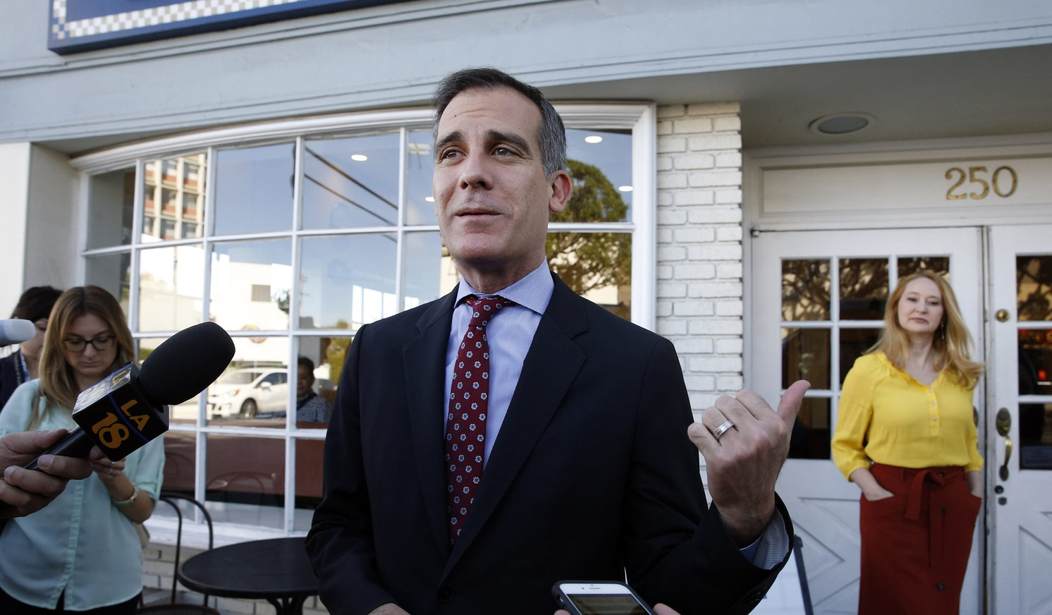Los Angeles Mayor Eric Garcetti, chairman of the Latino Alliance of the United States Conference of Mayors, argued that President Trump’s effort to stop federal funds from going to “sanctuary cities” for not fully cooperating with federal immigration authorities violates the U.S. Constitution.
According to Garcetti, most city attorneys have been communicating with each other “almost daily” and believe they are on “very strong” constitutional grounds in opposing the administration’s effort to crack down on sanctuary cities.
“The president under the Affordable Care Act pushed states to enforce Medicaid [expansion] and it was Chief Justice Roberts writing a majority opinion who said that it was unconstitutional under the Tenth Amendment,” Garcetti said during a March 21 conference call with other U.S. Conference of Mayors leaders. “You can’t put a fiscal gun to the head of cities in order to push another policy. We are ready to act. San Francisco is the first city to proactively challenge the proposed policy of the administration.”
Garcetti referred to the Trump administration’s list of jurisdictions that have policies limiting cooperation with Immigration and Customs Enforcement as a “scarlet letter” that includes almost every city with buildings and running water.
“The first so-called punishment to so-called sanctuary cities came through a proposal in the budget, which was to stop reimbursements in our mostly county jails but cities have some as well. We’re not affected by this but I think there’s a recognition, potentially, from the administration that to try to define or pull out what a sanctuary city is and what one isn’t is going to be a very perilous pathway legally, which is why they just withdrew this funding for all cities,” Garcetti said.
“So even those cities that this administration would say is adhering to what they want in terms of immigration policies at the local level also saw their funding get cut,” he added. “So I think it’s a very dangerous path for us to start losing funding that helps protect our nation.”
Garcetti said he does not want to spend his city’s “police resources” on cooperating with federal immigration authorities to deport undocumented immigrants that have not committed serious crimes.
“We were told in previous administrations that this would be done in a way that only focuses on serious crimes, and when we looked at the detainer requests they were not often focused on any serious crimes. It could be a suspicion of a crime. It could have been somebody who already served their time,” he said on the call.
“It could be a misdemeanor that became a felony because they didn’t pay a traffic bill. And that’s not where we want to spend our police resource time. And the most important part of this is the court found it unconstitutional to hold somebody longer than the legal requirement under the Constitution, so we feel that what they are asking us to do would violate the Constitution,” he added.
Providence, R.I., Mayor Jorge Elorza, USCM Immigration Reform Task Force co-chairman, said his city is on “very strong constitutional grounds” in opposition to the administration on this matter.
“If the administration does look to hold the cities accountable for the actions that we’ve taken, including reducing or holding federal funds, this is certainly something we’re going to fight in court,” he said.
Anaheim Mayor Tom Tait, also an Immigration Reform Task Force co-chairman, said enforcing federal immigration laws locally “erodes” the community’s trust in the police.
“We have worked very hard to build up trust between our police department and our community and Anaheim is probably a city of 350,000 people, maybe 50,000-70,000 undocumented – a large portion of our community,” he said. “Trust is essential to policing, and to ask local law enforcement to enforce immigration laws erodes that trust with a big portion of the community.”
Seattle Mayor Ed Murray, chairman of the USCM Mayors and Police Chiefs Task Force, explained why he opposes cooperating with federal immigration authorities in every situation.
“When individuals regardless of their document status are involved in crimes, particularly serious crimes, those individuals need to be prosecuted as in any situation,” he said. “There are situations we know of involving crime and international connections, including drug cartels on the West Coast where the federal legal enforcement agencies are our partners to identify that criminal activity and stop it. That’s very, very different than asking our police department to go in and take away an employee whose documents might not be in order – to pull kids out of school or who have spent their whole lives in our school system but are not citizens.”
During the recent National Governors Association meeting in Washington, PJM asked Democratic Colorado Gov. John Hickenlooper if he thinks Denver and Aurora should remain sanctuary cities.
“These are home rule cities, so the state doesn’t control how they do their public safety,” he said. “And there are Supreme Court cases that have come out strongly, Justice Scalia – strong opinions saying the federal government cannot compel municipalities to participate in federal programs such as immigration enforcement.”
Hickenlooper said someone without legal status who committed a violent crime in Denver is detained and federal authorities are informed.
“They work aggressively to make sure they are deported, so the criminals we should be focusing on are being focused on. So the question really is, who is the next level? Who is the federal government asking us to go after – go into homes, you know, break up families? That’s a very disruptive thing for a community,” the governor said. “Informants, if they don’t trust the police, even if they were an eyewitness to a crime, they’ll be less likely to come forward and give that evidence – that’s a bad situation.”









Join the conversation as a VIP Member